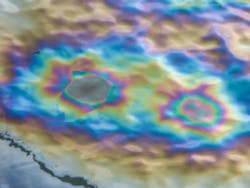WaterWorld Weekly Newscast, May 29, 2018
The following is a transcript of the WaterWorld Weekly Newscast for May 29, 2018.
Hi, I'm Angela Godwin for WaterWorld magazine, bringing you water and wastewater news headlines for the week of May 29. Coming up...
EPA to label PFAS 'hazardous'
Membrane separates oil, water on demand
Groups push for power plant effluent discharge permit
Fatal accident at Winnipeg water treatment plant
Last week, the U.S. EPA held its National Leadership Summit on per- and polyfluoroalkyl substances (PFAS), convening representatives from 40 states, 20 federal agencies, and other industry groups.
EPA Administrator Scott Pruitt said the information discussed at the summit will be used to develop a national PFAS management plan.
Several key actions were announced following the summit, including an effort to designate PFOA and PFOS as “hazardous substances”.
EPA also said it would begin steps to evaluate the need for an MCL for these substances.
Researchers at the University of British Columbia have developed a method for separating oil and water on demand, potentially paving the way for faster cleanups of oil spills and improved treatment of industrial wastewater.
It uses a membrane comprised of treated copper mesh that, depending on voltage applied, can be used to remove water from oil or vice versa.
A major advantage of the membrane, the researchers say, is that it is free of additives and toxic coatings.
It is also capable of achieving 98 percent purity of the separated oil and water, reducing post-processing requirements.
In industrial water news, environmentalists have filed a lawsuit in federal court, pushing for EPA to finalize a New Mexico power plant's discharge permit.
The groups, including the Sierra Club and the Center for Biological Diversity, maintain that the Four Corners Power Plant has missed three permitting cycles, with the most recent finalized permit having been issued in 2001.
According to operator Arizona Public Service, the plant has been inspected repeatedly with no violations found.
Nonetheless, the environmental groups say the plant is exposing the community to toxic discharges and believe a new permit should take into consideration advances in technology and pollution monitoring to protect people and the environment.
In international news, a worker at Winnipeg's Deacon Reservoir water treatment facility has died following a workplace accident at the plant.
The 58-year-old man was reportedly working on top of a large chemical tank when he fell to the ground.
He was later pronounced dead at the scene.
An investigation is being conducted into the cause of the accident.
For WaterWorld magazine, I'm Angela Godwin. Thanks for watching.
